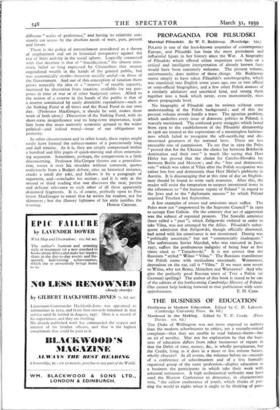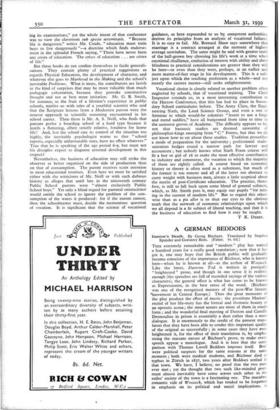THE BUSINESS OF EDUCATION
THE Duke of Wellington was not more exposed to authors than the modern schoolmaster to critics, yet a recently-voiced complaint—that they are unable to read balance-sheets--has an air of novelty. May not the explanation be that the busi- ness of education differs from other businesses of repute in that the Debit of time, money, &c., is wholly perspicuous, but the Credit, lying as it does in a more or less remote future, wholly obscure? At all events, the volumes before us—records of a conference of schoolmasters and of a less formally organised group of the same profession—display education as a business the participants in which take their work with actuarial seriousness. A high ecclesiastical authority may have used the Harrow Conference to denounce, in characteristic vein, " the callow exuberance of youth, which thinks of put- ting the world to rights when it ought to be thinking of pass-
ing its examinations," yet the whole intent of that conference was to view the classroom sub specie aeternitatis. " Because life is dangerous," writes Mr. Coade, " education must train boys to live dangerously "—a doctrine which finds endorse- ment in the splendid French saying, " There have never been any crises of education. The crises of education . . . are crises of life."
But these books do not confine themselves to facile generali- sations. They contain plenty of practical suggestions as regards Physical Education, the development of character, and whatever else goes to Manhood in the Making and the school's inevitable Problems. What is more, the contributors are lavish in the kind of surprises that may be more valuable than much pedagogic exhortation, because they provoke constructive thought and not at best mere imitation. Mr. G. B. Smith, for instance, as the fruit of a lifetime's experience in public schools, startles us with tales of a youthful scientist who said that the Scripture lessons from a Modernist parson were the nearest approach to scientific reasoning encountered in his school career. Then there is Mr. A. S. Neill, who finds that parents prefer a boarding school of a hard type because it instils a flattering, albeit strictly relative, fondness for home life! And, lest the school rate its control of the situation too highly, the inevitable psychologist warns us that " school reports, especially unfavourable ones, have no effect whatever." True that he is speaking of the age period 6-9, but must not his disciples expect to diagnose arrested development in this respect?
Nevertheless, the business of education may still strike the observer as better organised on the side of production than on that of consumption. The parent receives scant attention in most educational treatises. Even here we must be satisfied either with the witticisms of Mr. Neill or with such dubious history as alleges that until late in the nineteenth century Public School parents were " almost exclusively Public School boys." Yet only a blind regard for parental omniscience would entitle the school to ignore the problem of the con- sumption of the wares it produced : for if the parent cannot, then the schoolmaster must, decide the momentous question of vocation. It is significant that the science of vocational guidance, as here expounded to us by, competent authorities. derives its principles from an analysis of vocational failures. It is so easy to fail. Mr. Bernard Shaw says somewhere that marriage is a contract arranged at the moment of highest average unwisdom. The same might be said with greater truth of the half-grown boy choosing his life's work at a time when emotional ebullience, confusion of interest with ability and sheer blindness to practical considerations are greater than they will be later—or even than they were, perhaps, at an earlier and more matter-of-fact stage in his development. This is a sub• ject upon which the teaching profession as a whole—and not merely the careers master—still seeks enlightenment.
Vocational choice is closely related to another problem often neglected by schools, that of vocational training. The Chief Inspector reminds us, in a most interesting contribution to the Harrow Conference, that this has had its place in Secon- dary School curriculums before. The Army Class, the Engi- neering Sixth, the Land Science Group, and even a sort of Seminar in which would-be colonists " learnt to use a forge and mend saddles," have all burgeoned from time to time in the austerest groves of Academe. The difficulty appears to be, not that banausic studies are deemed unworthy of philosopher-kings emerging from " C " Forms, but that we do not know how to set about these studies. Tradition prescribes a mode of preparation for the university ; professional trade- unionism hedges round a narrow path for lawyer and accountant ; but nobody knows what Sixth Form course will fit a boy or girl of 18 to make the most effective contribution to industry and commerce, the vocation to which the majority of them are rightly called. A course based on economic history or theory is often used as a substitute, but much of the former is too remote and all of the latter too abstract to carry weight with business men, always a little sceptical about the merits of post-Certificate education. The practice, there- fore, is still to fall back upon some blend of general subjects, which, as Mr. Smith puts it, may equip our pupils " for mix- ing in the current of modern life." But to regard this other- wise than as a pis oiler is to shut our eyes to the obvious truth that the network of economic relationships upon which we all depend is a fit subject of liberal teaching, and that it is the business of education to find how it may be taught.
T K. DERRY.



































































 Previous page
Previous page